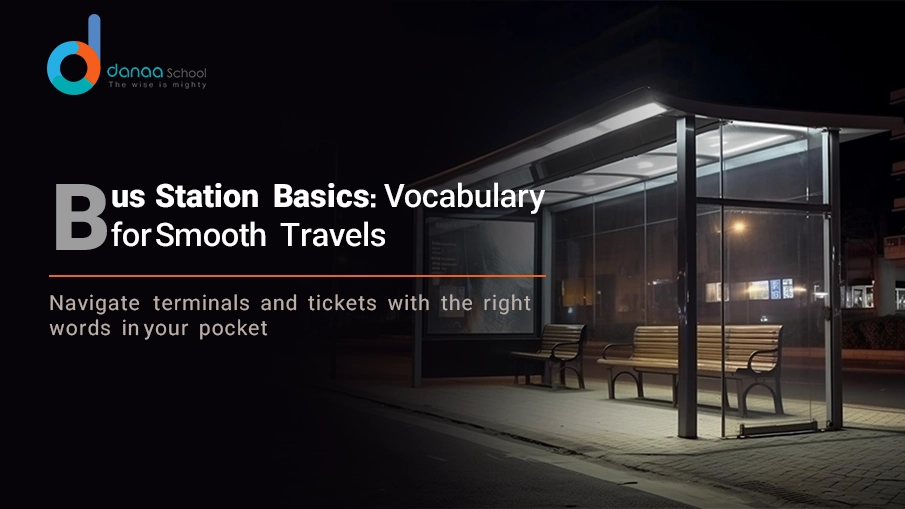Bus Station Vocabulary (English + Farsi): A Complete Travel Guide for Travelers
Bus stations can feel confusing—especially when you are traveling in a new country and need to ask questions quickly. This guide covers essential bus station vocabulary with clear meanings and practical examples. If you are learning Farsi (Persian) for travel, you will also find common English + Farsi terms and useful phrases you can say at a bus station.
By the end, you’ll know what key words like platform, timetable, and fare mean—and how to use them in real situations.
Bus Station Vocabulary: Key Words and Meanings
These are the most common bus station words you’ll see on signs, tickets, and announcements:
- Platform – the area where buses arrive and depart
- Timetable – a schedule showing departure and arrival times
- Ticket counter – the booth where passengers buy tickets
- Fare – the price of the journey
- One-way ticket – a ticket for a single journey
- Round-trip ticket – a ticket for going and returning
- Departure time – when the bus leaves
- Arrival time – when the bus is expected to arrive
- Waiting area – a space to sit and wait
- Luggage – bags and suitcases you travel with
Bus Station Vocabulary in Farsi (Persian): English + Farsi + Pronunciation
If you are traveling to a Persian-speaking country or simply learning Farsi for travel, these translations will help you communicate more confidently.
| English | Farsi (Persian) | Pronunciation |
|---|---|---|
| Bus station | ترمینال اتوبوس / پایانه | terminal-e otobus / pâyâne |
| Platform | سکو / سکوِ حرکت | seku |
| Ticket | بلیط | belit |
| Ticket counter | باجهٔ بلیط | bâje-ye belit |
| Timetable | جدول زمانبندی / برنامه حرکت | jadval-e zamân-bandi / barnâme-ye harekat |
| Departure | حرکت | harekat |
| Arrival | ورود / رسیدن | vorud / residan |
| Fare / Price | کرایه | kerâye |
| Seat | صندلی | sandalî |
| Reservation | رزرو | rezerv |
| Luggage | بار / چمدان | bâr / chamedân |
| Delay | تأخیر | ta’khir |
| Cancellation | لغو | laghv |
Useful Phrases at a Bus Station (English + Farsi)
These short sentences are practical for real-life travel situations:
- Where is platform 3? – سکو شماره ۳ کجاست؟ (seku-ye shomâre-ye se kojâst?)
- What time does the bus leave? – اتوبوس ساعت چند حرکت میکند؟ (otobus sâ’at chand harekat mikonad?)
- How much is the fare? – کرایه چقدر است؟ (kerâye cheghadr ast?)
- I want a one-way ticket to … – یک بلیط یکطرفه تا … میخواهم. (yek belit yek-tarafe tâ … mikhâham.)
- Is the bus delayed? – اتوبوس تأخیر دارد؟ (otobus ta’khir dârad?)
- Is it cancelled? – لغو شده؟ (laghv shode?)
Bus and Train Station Shared Vocabulary
Some travel words are used in both bus and train stations. Knowing them helps when you transfer between services:
- Transfer – changing from one bus/train to another
- Intercity – a service connecting cities over long distances
- Local service – a service operating within a city or nearby area
- Express – a faster service with fewer stops
Learn Farsi with Danaa School
If you’re preparing for travel and want to communicate more confidently, learn Farsi and make your trip smoother and more enjoyable. Danaa School offers structured Persian courses designed for real-life situations—especially travel conversations, pronunciation, and practical vocabulary.
FAQs
What is a timetable at a bus station?
A timetable is a schedule that lists bus departure and arrival times.
What is a platform in a bus station?
A platform is the designated area where passengers board or leave the bus.
What does “fare” mean in public transport?
Fare is the price you pay for a bus journey.
What is an express bus service?
An express bus service is faster because it makes fewer stops.
How can I book a bus ticket in advance?
You can usually book online, at the ticket counter, or via the operator’s mobile app.
Conclusion
Mastering bus station vocabulary helps you navigate transport hubs with confidence. With the key terms, Farsi translations, and practical phrases in this guide, you’ll be better prepared for real travel situations—whether you’re traveling locally or internationally.









